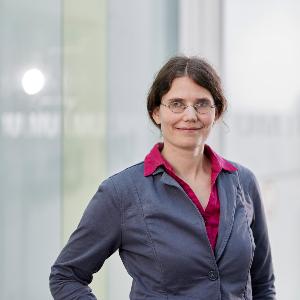Hunting the bug
8 Apr 2024
Computer scientist Marie-Christine Jakobs is an expert on the reliability of software.
8 Apr 2024
Computer scientist Marie-Christine Jakobs is an expert on the reliability of software.

Marie-Christine Jakobs, Professor of Reliable Software at LMU’s Institute of Informatics | © LMU / Stephan Höck
Through her research, Marie-Christine Jakobs helps make technology safer. The computer scientist works on methods to assess the quality of software. “I’m interested in whether a piece of software fulfills certain properties and then I check that. This can be something like the software not crashing, or that it behaves as anticipated when executing a certain function. Ultimately, it is about the safety characteristics,” says Marie-Christine Jakobs, Marie-Christine Jakobs, who has been Professor of Reliable Software at LMU’s Institute of Informatics since April 2023.
The real challenge here lies before the actual analysis “What exactly are the properties you want to check, and what should the results look like? Precisely defining these things is not always such a trivial matter.” Marie-Christine Jakobs practices basic research. She develops so-called formal methods for analyzing software and proves theoretically that they are reliable. Another of her main interests concerns implementation of the methods in software analysis tools.
In her research, and also in her lectures, the computer scientist looks at practical real-world examples. For example, she discusses the spectacular explosion of the Ariane 5 rocket in 1996, for which an error in the program code was responsible. The “costliest software error of all time,” as it was dubbed, caused the rocket to explode after just 40 seconds. From a research point of view, it is interesting to analyze the source code of such faulty systems to determine if one’s own tools would have identified the problem, observes Jakobs.
Professor Jakobs’s research has multiple points of connection with the Institute of Informatics. She was a postdoc in the research group of Professor Dirk Beyer from 2017 to 2019, before she took up an assistant professorship at TU Darmstadt. “I was in the same teaching and research unit back then that I’m assigned to now. It was one of the main pull factors that drew me back that the environment was right for me in terms of the topics studied here.” And this applies very much as well to the research interests of her two new colleagues Jasmin Blanchette and Professor Johannes Kinder, who also joined LMU recently.
As a female professor in the field of computer science, she is used to being in a minority. “People sometimes call me a role model, and I’m glad to be one,” says Jakobs. She herself was always encouraged to take this path. “I had early contact with computers. I always found them fascinating.” At school, she specialized in informatics and physics at junior high and then chose informatics as her honors course while studying for the Abitur school leaving exams.
Jakobs did a degree in computer science at Paderborn University, where she was a research assistant in the group of Professor Heike Wehrheim while completing her master’s degree and where she also did her doctorate. For her dissertation on proof-carrying, she won a science award.
As a professor, Jakobs has started volunteering in the mentoring program at her faculty. “I’ve taken on my first mentee and am looking forward to supporting her. I’m also happy to share my experiences so that the female students see: It works; it can be done.”